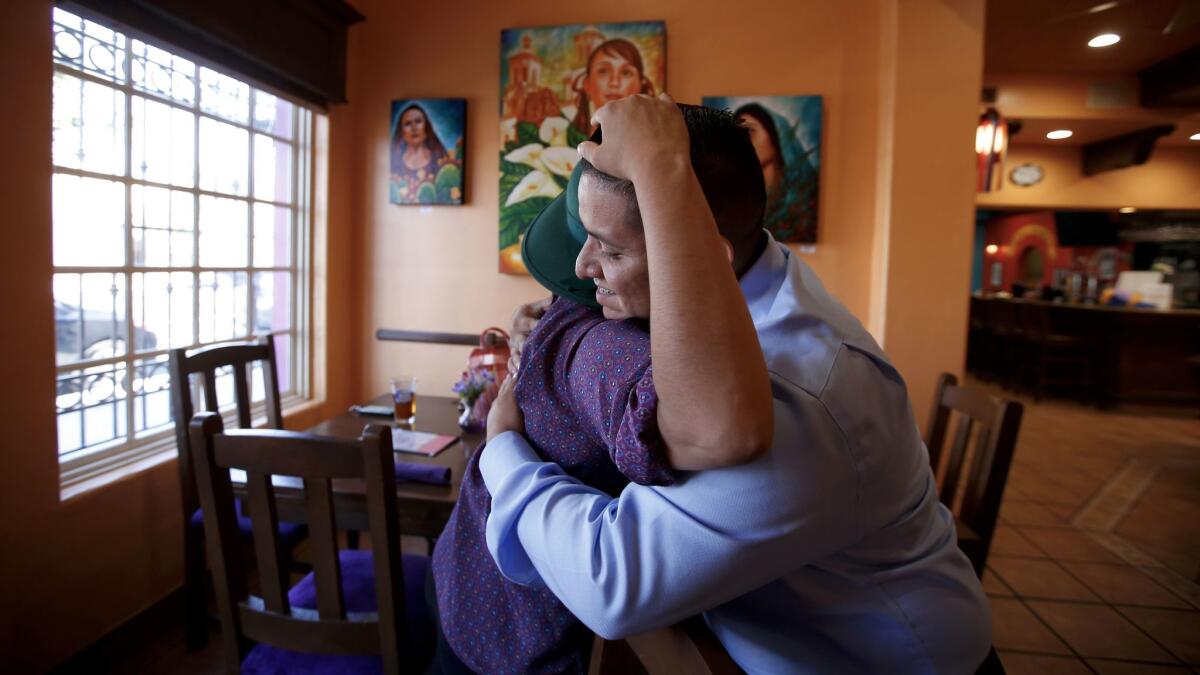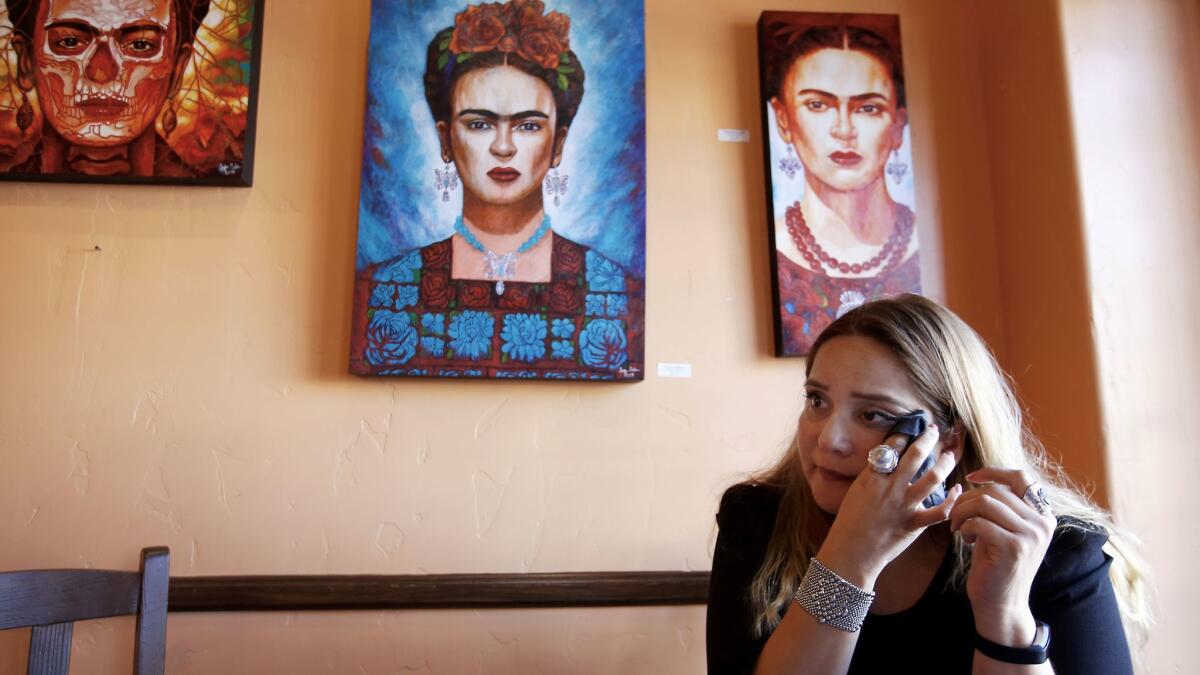Column: Stunned, disappointed, but still defiant and hopeful: ‘Dreamers’ press on despite Trump’s DACA stance

For years, his schedule was unforgiving. Juan Casas left his Boyle Heights home after midnight, loaded produce onto trucks from 2 a.m. until noon in downtown Los Angeles, then drove to school and caught a nap in the Cal State L.A. parking lot before classes.
Now 28, Casas has an electrical engineering degree and works for an aerospace company.
On Tuesday morning, Casas took a break from his job to call his mother with the news that DACA — the Deferred Action for Childhood Arrivals program — was being terminated. He and 800,000 others brought to the U.S. illegally when they were too young to understand immigration law, or have a say in the matter, now could be deported.
“She was full of emotion,” Casas said of his mother, who had just gotten off her graveyard shift at a Los Angeles factory. “I had a feeling this was coming, but it just really broke me down.”

Juan Casas loaded produce trucks on the graveyard shift, working his way through college. He earned an electrical engineering degree at Cal State L.A. and now works for an aerospace company.
For Casas, there is no solace in knowing he’s not alone.
Gabriela, inspired by her mother’s determination to rise above the poverty they were born into in southern Mexico, earned a Cal State political science degree and then a master’s at a private university in Northern California, majoring in international studies.
Today at 26, she works for a Silicon Valley social media company and volunteers with a faith-based social justice nonprofit.
When the news came in Tuesday morning, she messaged me from work.
“My heart is heavy for the sacrifice my family made,” she wrote, asking that her full name not be published.
This is how it went Tuesday, as word of the DACA decision spread. There were tears, feelings of betrayal, and vows to keep fighting.
But no one could have been surprised by what happened. During his campaign for president, Donald Trump promised to end DACA if elected. Then he changed his mind, saying DACA kids could rest easy because “this is a case of heart.”
No one trusted that, given Trump’s relationship with the truth, and no one was shocked to learn that Trump’s heart had calcified. On Tuesday, he pivoted again in a murky, cowardly way. He sent Atty. Gen. Jeff Sessions to the stage to say DACA was an unconstitutional overreach by President Obama.
So is it over?
Yes. And no.
DACA is being phased out, Sessions said. Not immediately, and some of those already in the program may have a chance to extend their temporary legal status. But unless Congress comes up with a replacement, DACA will be done. And this is a deeply divided Congress that can’t agree on anything.
Booting people to countries many of them barely know isn’t just callous, it’s bad economics. While the constitutional implications of DACA may be debatable, you’d think a president who passes himself off as a brilliant businessman might have risen above a base instinct to exploit the politics of race.
If you’re a DACA participant, there’s a pretty good chance you’re a striver. You’ve got to be in school or working, or both.
“It’s one thing to root out criminals,” said USC demographer Dowell Myers. “But DACA kids are not criminals. They’re like manna from heaven. We’ve already invested in them. They’re required to be good kids to be part of the program. And you would chase them away?”
Yes, apparently, and just as they’re becoming taxpayers.
“At age 25, every kid becomes a net contributor, no matter their education level, but the more educated you are, the bigger contribution you make,” Myers said.
That’s critical because as the nation ages, we’ve got a shortage of children, thanks in part to a slower birth rate. We could be looking at critical labor shortages at a time when more retirees rely on employee contributions to Social Security and Medicare. Will there be enough working people to buy the homes of retirees, to take care of seniors, to support the safety net institutions they rely on?
“Everyone looks at disparities,” Myers said of division over immigration. “But we’re all connected.”
The DACA participants I’ve spoken to have similar stories about discovering — usually when the college application process began in high school — that they were not citizens. With Trump’s rise, they tended to worry first and foremost about their families rather than themselves because in signing up for DACA and providing family information to the government, they took a risk.
“My biggest fear is to come home and hear that my relatives have been picked up by [Immigration and Customs Enforcement] ICE,” Casas said.
He was 2 when he came north. He has no recollection of that but said his mother had only one goal: a chance for her son to have more opportunity than she had ever known.
“She’s pretty much my hero,” Casas said.
Gabriela said the same.
“To get to a point in your life where you have to risk everything for your children to survive, I can’t imagine that,” she said of her mother.
Casas looked crestfallen Tuesday after work, when he met with a longtime mentor, Alma Marquez, at a Boyle Heights cafe.
He had played by the rules, acting in good faith, only to be undermined. He said he and his mother still hold out hope that Trump, as a father, will ultimately decide not to tear families apart.
“We have to come together and try to get Congress to do the right thing,” Marquez said as she wiped away tears, saying she thought the day might have played out differently. Many in the business community, and even in the Republican Party, had pushed for keeping DACA.
So she began the day with hope. Then, when Trump sent Sessions before the cameras rather than deliver the grim news himself, it was “like a slap in the face” to “Dreamers,” Marquez said.
Up north, Gabriela sounded as if, for her, the fight had just begun.
“There needs to be a fire that awakens people to tell their stories. Enough is enough,” she said. “There’s an evil narrative — that we’re evil, we’re rapists, we’re x, y and z. I’m a daughter. I’m a worker. There are so many things about me as a person, aside from a status I have no control over.”
It’ll be months before we know whether Congress or the president — who just pardoned notorious anti-immigration former Sheriff Joe Arpaio — will actively round up and deport hardworking young people who came to the U.S. as innocents, rather than focus instead on those who break the law.
But the uncertainty alone is an act of cruelty. And the threat of deporting some of the nation’s best and brightest — coming from a president too craven to deliver the news himself — is hateful, un-American and cause for shame.
So what to do? I asked that question of Casas.
Keep working, he said. Keep doing the right thing. Keep fighting.
“All we can do is continue taking care of our responsibilities.”

Get more of Steve Lopez’s work and follow him on Twitter @LATstevelopez.
ALSO
How to find help if you’re a Dreamer
Decision on DACA opens a new period of worry and uncertainty for Dreamers
UPDATES:
6:40 p.m.: This article was updated with comments from Casas’ mentor and other details.
This article was originally published at 11:40 a.m.
More to Read
Sign up for Essential California
The most important California stories and recommendations in your inbox every morning.
You may occasionally receive promotional content from the Los Angeles Times.











